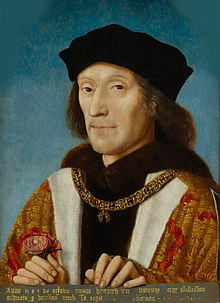
Back Hendrik VII van Engeland Afrikaans Henrique VII d'Anglaterra AN Heanric VII Engla Cyning ANG هنري السابع ملك إنجلترا Arabic هنرى السابع ملك انجلترا ARZ VII Henri (İngiltərə kralı) Azerbaijani یئدینجی هنری (اینگیلیس) AZB Генрых VII Цюдар Byelorussian Генрых VII (кароль Ангельшчыны) BE-X-OLD Хенри VII Bulgarian
| Henry VII | |
|---|---|
 Henry holding a rose and wearing the collar of the Order of the Golden Fleece, painted by an unknown Netherlandish artist, 1505 | |
| King of England | |
| Reign | 22 August 1485 – 21 April 1509 |
| Coronation | 30 October 1485 |
| Predecessor | Richard III |
| Successor | Henry VIII |
| Born | Henry Tudor, Earl of Richmond 28 January 1457 Pembroke Castle, Pembrokeshire, Wales |
| Died | 21 April 1509 (aged 52) Richmond Palace, Surrey, England |
| Burial | 11 May 1509 Westminster Abbey, London, England |
| Spouse | |
| Issue more... | |
| House | Tudor |
| Father | Edmund Tudor, 1st Earl of Richmond |
| Mother | Lady Margaret Beaufort |
| Signature |  |
Henry VII (28 January 1457 – 21 April 1509) was King of England and Lord of Ireland from his seizure of the crown on 22 August 1485 until his death in 1509. He was the first monarch of the House of Tudor.[a]
Henry's mother, Margaret Beaufort, was a descendant of John of Gaunt, founder of the House of Lancaster and son of King Edward III. Henry's father, Edmund Tudor, 1st Earl of Richmond, a half-brother of Henry VI of England, and a member of the Welsh Tudors of Penmynydd, died three months before his son Henry was born. During Henry's early years, he supported his uncle Henry VI and the Lancastrian cause in fighting the civil wars against Edward IV, a member of the Yorkist branch of the House of Plantagenet. After Edward retook the throne in 1471, Henry Tudor spent 14 years in exile in Brittany. He attained the throne when his forces, supported by France, Scotland and Wales, defeated Richard III at the Battle of Bosworth Field. He was the last king of England to win his throne on the field of battle, defending it two years later at the Battle of Stoke Field to decisively end the Wars of the Roses (1455–1487). Vindicating the Lancastrian cause, he cemented his claim by marrying the Yorkist heiress, Elizabeth of York, daughter of Edward IV.
Henry restored power and stability to the English monarchy following the civil war. He is credited with many administrative, economic and diplomatic initiatives. His supportive policy toward England's wool industry and his standoff with the Low Countries had long-lasting benefits to the English economy. He paid very close attention to detail, and instead of spending lavishly he concentrated on raising new revenues. He stabilised the government's finances by introducing several new taxes. After his death, a commission found widespread abuses in the tax collection process. Henry reigned for nearly 24 years and was peacefully succeeded by his son, Henry VIII.
Cite error: There are <ref group=lower-alpha> tags or {{efn}} templates on this page, but the references will not show without a {{reflist|group=lower-alpha}} template or {{notelist}} template (see the help page).
© MMXXIII Rich X Search. We shall prevail. All rights reserved. Rich X Search